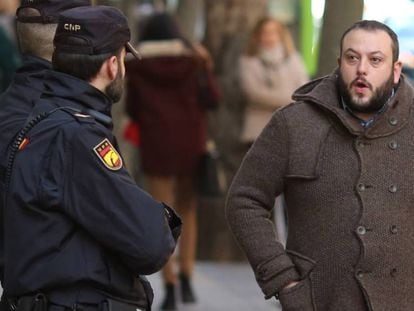“Two and a half years in jail for tweets is madness”: Granddaughter of assassinated Spanish PM
Relative of Franco-era leader slams suggested prison term for student who tweeted jokes about murder
A granddaughter of Admiral Luis Carrero Blanco, a prime minister during the final years of the regime of Spanish dictator General Francisco Franco, has sharply criticized the two years and six months prison sentence a public prosecutor at the Spanish High Court has demanded for a 21-year-old student who posted jokes on Twitter about his assassination by Basque pro-independence group ETA in 1973.

In a letter to EL PAÍS, Lucía Carrero-Blanco describes the public prosecution’s call as “disproportionate and total madness,” adding: “I am frightened by a society where freedom of speech, however regrettable it might be, can mean a jail term.”
The High Court public prosecutor has also called for a three-year parole term to be imposed on the student, Cassandra Vera.
With a criminal record, I would lose my university grant and without it I can’t study Cassandra Vera
Luis Carrero Blanco was killed when an ETA activist set off a bomb as his car passed through a narrow street in downtown Madrid on the morning of December 20, 1973. The explosion sent his vehicle 35 meters in the air, over a building and into the patio of a convent.
More than 40 years later, history student Vera, posted a series of jokes on her Twitter account, @kira_95, that the public prosecutor considered constituted the crime of “humiliating victims.” Lucía Carrero-Blanco says in her letter to EL PAÍS that she does not feel humiliated “in any way” by the tweets, which she described as being in “bad taste.”
Vera, who describes herself on Twitter as a radical feminist, a transgender girl and a student of history, posted some 13 tweets between late 2013 and early 2016 about the assassination of Carrero Blanco, one of which read: “ETA launched a policy against official cars combined with a space program.” Another featured the date 20D next to an image that a public prosecutor described as “an astronaut with the face of Admiral Carrero Blanco on what appears to be the surface of the moon and the Spanish flag of the dictatorship.”
On January 10, following the public prosecutor's decision, Vera posted a tweet saying: “They are calling for 2 years and 6 months jail and then 3 years parole for jokes about Carrero Blanco. Just that, jokes about a dictator.”
In her letter to EL PAÍS, Lucía Carrero-Blanco says that Vera’s tweets were “repugnant” and that she was saddened that anybody would make jokes about a murder. But she also describes the call for a jail term as “disproportionate” and “frightening.”
It is dangerous to impose respect on people using threats and excessive sanctions
Lucía Carrero-Blanco
“I consider it a dangerous mistake to try to impose respect on people on the basis of threats and excessive sanctions,” she adds.
Vera said she appeared before a judge in September 2016 to make a statement, believing at the time that the High Court would drop the investigation. “I explained to the judge that they were jokes about a historical figure, the head of a government under the dictatorship, and that I have never made jokes about other victims of terrorism,” she told EL PAÍS by phone.
In 2015, the High Court absolved Guillermo Zapata, a Madrid City Hall councilor who also faced charges of humiliating victims after he posted tweets mocking Irene Villa, who lost both her legs in an ETA car bombing in 1991. Villa stated at the time that she was not bothered about the “jokes.” Zapata was forced to stand down from his post over the affair.
The same year, the High Court imposed an 18-month jail term on Beñat Lasa Fernández for tweeting an image of the aftermath of the car bombing of Carrero Blanco alongside the words “To infinity and beyond,” taken from the film Toy Story. The sentence was later reduced after Lasa Fernández pleaded guilty.
If the High Court accepts the sentence demanded by the prosecution, Vera would have to go to jail. But even if the sentence is reduced and she avoids prison, she says she is worried about the consequences.
“I have volunteered for a social work project in Murcia and to take part I have to provide a certificate of criminal record,” she explains. A sentence would also prevent her from fulfilling her goal of becoming a teacher, and even to abandon her university studies.
“With a criminal record, I would lose by university grant and without it I can’t study,” she says.
English version by Nick Lyne.













































